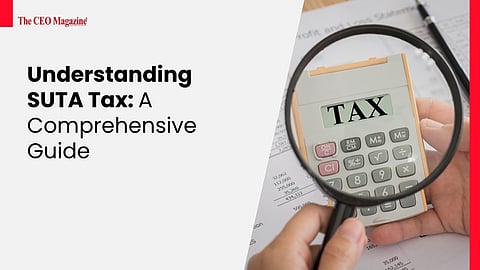
- News
- Women
- Magazine
- IndustryIndustry
- InsightsInsights
- Success Stories
- PublishPublish
- ContactContact
- Media KitMedia Kit

Understanding SUTA Tax: A Comprehensive Guide
State Unemployment Tax Act (SUTA) tax is an essential component of the unemployment insurance system in the United States. This tax is levied on employers to fund unemployment benefits for workers who lose their jobs through no fault of their own. Understanding SUTA tax is crucial for employers and employees alike, as it impacts payroll costs and the benefits available to unemployed workers. This article delves into what SUTA tax is, how it operates, and its significance in the broader context of the unemployment insurance framework.
What is SUTA Tax?
SUTA tax is a state-level tax that employers must pay to fund unemployment insurance programs. Each state administers its own unemployment insurance system, leading to variations in SUTA tax rates and regulations. The tax is assessed on a percentage of each employee's wages, up to a specified wage base limit. Employers are responsible for paying this tax; employees do not contribute to SUTA.
Importance of SUTA Tax
SUTA tax plays a vital role in providing financial assistance to unemployed workers. Here are a few key reasons why it is significant:
Financial Safety Net: SUTA tax ensures that workers who lose their jobs have access to unemployment benefits, helping them support themselves and their families during periods of unemployment.
Economic Stability: By providing unemployment benefits, SUTA tax contributes to economic stability. It helps maintain consumer spending during downturns, supporting local businesses and the overall economy.
Employer Compliance: Understanding and complying with SUTA tax regulations is essential for employers. Non-compliance can lead to penalties and increased tax rates.
How SUTA Tax Works
Tax Rate Determination: Each state sets its own SUTA tax rate, which can vary based on the employer's experience rating. New employers typically start with a standard rate, while established employers may receive a lower rate if they have a history of low unemployment claims.
Wage Base Limit: SUTA tax is only applied to wages up to a certain limit, known as the wage base limit. This limit varies by state and is adjusted periodically.
Reporting Requirements: Employers are required to report their taxable wages and pay SUTA taxes to the state unemployment agency. Reporting frequency may vary, but it is often done quarterly.
Differences Between SUTA and FUTA Tax
While SUTA tax is state-specific, the Federal Unemployment Tax Act (FUTA) tax is a federal tax that provides funding for state unemployment insurance programs. Here are some key differences:
Rate: FUTA tax is set at a flat rate of 6.0% on the first $7,000 of each employee's wages. Employers can receive a credit of up to 5.4% for timely SUTA tax payments, reducing the effective FUTA rate to 0.6%.
Distribution: FUTA funds are used to provide administrative support and to maintain state unemployment programs during periods of high unemployment, while SUTA taxes fund state-level benefits.
Implications for Employers
Budgeting for Payroll Taxes: Understanding SUTA tax helps employers budget effectively for payroll expenses. As SUTA tax rates can fluctuate, employers should monitor their state’s unemployment tax regulations and adjust their financial forecasts accordingly.
Managing Experience Ratings: Employers with a history of high unemployment claims may face higher SUTA tax rates. To manage these costs, employers can implement strategies to retain employees and reduce layoffs.
Compliance and Record-Keeping: Accurate record-keeping is crucial for SUTA compliance. Employers should maintain detailed payroll records and be aware of state-specific reporting requirements to avoid penalties.
Conclusion
SUTA tax is an essential aspect of the unemployment insurance system in the United States, providing a safety net for workers and contributing to economic stability. By understanding how SUTA tax operates, employers can better manage their payroll costs and ensure compliance with state regulations. Staying informed about changes in SUTA tax rates and regulations will help businesses navigate this critical aspect of employment and support their workforce effectively.
Follow us on Google News
